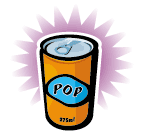|
The incidence of diabetes has risen sharply in the past several decades, paralleling the obesity epidemic. At the same time, soft drink consumption has seen a 61 percent increase in adults from 1977-97, and a 100 percent increase in children from 1977-78 to 1994-98. Researchers believe that in addition to contributing to obesity, sugar-sweetened soft drinks may increase diabetes risk by raising blood glucose levels due to their high concentration of high-fructose corn syrup.
Researchers performed separate analyses of diabetes and weight change on women participating in the Nurses’ Health Study II between 1991-1999. Women in the diabetes analysis were free of diabetes and other major chronic diseases at baseline. Anyone reporting a diagnosis of diabetes on a biennial questionnaire was sent a second questionnaire asking about diagnosis and treatment for the condition, and to distinguish between type 1 and type 2. Women in the weight change analysis were evaluated at baseline and in 1995 and 1999, providing complete dietary information, including soft drink consumption and weight.
 Results: Women who reported an increased intake of sugar-sweetened soft drinks between 1991 and 1999 had significantly larger increases in weight and body mass index (BMI) than women who maintained their intake or who substantially decreased their intake. Greater soft drink consumption over that time period was also strongly associated with a progressively higher risk of developing type 2 diabetes. The association of soft-drink consumption to diabetes was significant even when weight gain and increases in BMI were taken into account. Results: Women who reported an increased intake of sugar-sweetened soft drinks between 1991 and 1999 had significantly larger increases in weight and body mass index (BMI) than women who maintained their intake or who substantially decreased their intake. Greater soft drink consumption over that time period was also strongly associated with a progressively higher risk of developing type 2 diabetes. The association of soft-drink consumption to diabetes was significant even when weight gain and increases in BMI were taken into account.
According to the authors, higher consumption of sugar-sweetened beverages may increase the risk for type 2 diabetes by providing excessive calories and large amounts of rapidly absorbable sugars. The researchers also recommend that “public health strategies to prevent obesity and type 2 diabetes should focus on reducing sugar-sweetened beverage consumption.”
Ditch the soda pop! To quench your thirst, try a glass of iced water with a slice of lemon or lime instead. And for more nutrition information, visit www.chiroweb.com/find/archives/nutrition.
Reference:
Schulze MB, Manson JE, Ludwig DS, et al. Sugar-sweetened beverages, weight gain, and incidence of type 2 diabetes in young and middle-aged women. Journal of the American Medical Association, Aug. 25, 2004;292(8):927-34.
|



